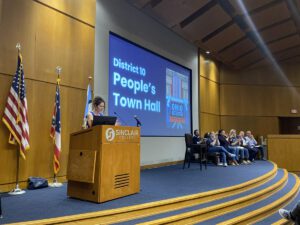With the absence of their elected representative, concerned citizens of Ohio’s 10th Congressional District gathered on Thursday evening for a grassroots “People’s Town Hall” at Sinclair Community College in Dayton. Organized to address pressing local and national issues, the event offered a platform for residents to voice their concerns directly, despite Congressman Mike Turner’s decision not to attend.

Rose Lounsbury emceed the People’s Town Hall. Photo by Libby Ballengee
An empty chair on stage symbolized the Congressman’s absence, underscoring what many attendees described as a lack of accessibility and accountability to constituents.
Speakers at the event covered a wide range of issues currently affecting District 10 residents, including the impact of recent state and federal policy changes on immigration, Social Security, Medicaid, veterans’ benefits, and layoffs of government workers.
“This town hall is about people standing up for each other, especially when our leaders won’t show up to hear us,” said one local attendee. “These are life-or-death issues for many in our community. We deserve to be heard.”

Speakers from The People’s Town Hall. Photo by Libby Ballengee
The town hall drew attendees from across the district, including retirees, veterans, public workers, and families concerned about the direction of policy decisions that directly affect their lives. Several speakers called for more transparent and responsive representation in Congress, and urged community members to stay engaged and active.
While Congressman Turner declined the invitation to attend, organizers say the event marks only the beginning of ongoing efforts to bring constituent voices to the forefront.
The People’s Town Hall was coordinated by a coalition of grassroots advocates committed to elevating civic engagement and local accountability, including Melissa Rodriquez, Leslie Merry, Kim Senft-Paras, Rose Lounsbury, and Laurel Kerr.
Attendees were encouraged to follow up with action items, including checking their voter registration status, signing the local petition against Ohio House Bill SB1, and contacting their representatives about their concerns.